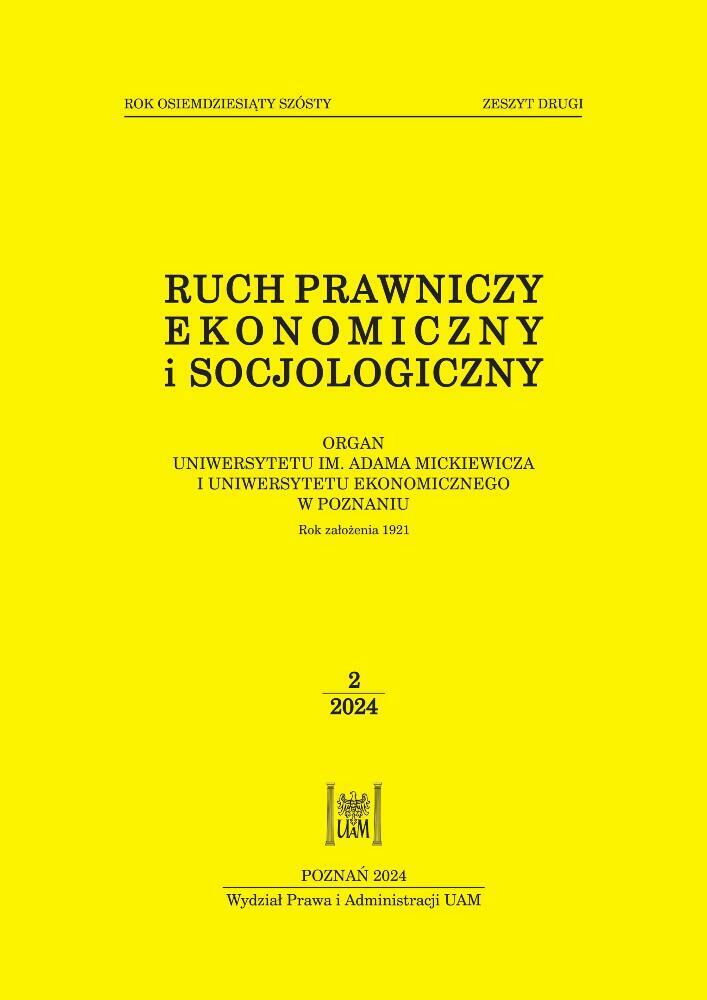Abstract
In a stable, functioning democracy, the law serves crucial social functions that contribute, on the one hand, to fostering consensus among members of society regarding the values implemented by the law, and on the other hand, to forming a sense of approval for the actions of the State and public authorities. The article concerns the opposite situation, namely the specificity of the relationship between the governing and those being governed, as well as the actions of power entities during the crisis of the idea of the rule of law and liberal constitutionalism. In order to describe these issues, the processes of legitimization and delegitimization of the legal order are characterized and confronted with the activities referred to in the literature as the instrumentalization of law. It seems that all these processes are closely interconnected. The instrumentalization of law, conducted with respect for the rules of construction of the legal system, appears as a significant element of the process legitimization of the legal system, in particular during a period of political transformation. In turn, the so-called wrongful instrumentalization of law demonstrates a significant connection with the process of delegitimization of the legal order, in which the construction of social order and respect for the rule of law take a back seat, and the most important aim of political power becomes the deconstruction of the existing understanding of democratic constitutional principles in favour of the projected vision of social relations.
References
Bexell, M., Jönsson, K., i Uhlin, A. (2022). The politics of legitimation and delegitimation in global governance: A theoretical framework. W: M. Bexell, K. Jönsson i A. Uhlin (red.), Legitimation and delegitimation in global governance: Practices, justifications, and audiences (s. 25–45). Oxford University Press. DOI: https://doi.org/10.1093/oso/9780192856111.003.0002
Bożek, M. (2022). Integralna legitymizacja konstytucji. Przegląd Konstytucyjny, 4, 7–28. DOI: https://doi.org/10.4467/25442031PKO.22.026.16991
Czarnota, A. (2019). Populistyczny konstytucjonalizm czy nowy konstytucjonalizm? Krytyka Prawa, 11(1), 27–42. DOI: https://doi.org/10.7206/kp.2080-1084.273
Czarnota, A., Paździora, M., i Stambulski, M. (2021). Konstytucjonalizm a sfera publiczna, W: A. Czarnota, M. Paździora i M. Stambulski (red.), Nowy konstytucjonalizm. Polityczność, tożsamość, sfera publiczna (s. 9–29). Scholar.
Fuller, L. L. (1993). Anatomia prawa (R. Tokarczyk, tłum.). Wydawnictwo Daimonion; Instytut Wydawniczy.
Huntington, S. (2009). Trzecia fala demokratyzacji (A. Dziurdzik, tłum.). Wydawnictwo Naukowe PWN.
Kaleta, K. J. (2022). Aksjologiczne podstawy konstytucyjnego prawa intertemporalnego. W: P. Radziewicz (red.), Zagadnienia konstytucyjnego prawa intertemporalnego (s. 13–70). Oficyna Wydawnicza Politechniki Warszawskiej.
Kokot, P. (2019). Działalność orzecznicza Trybunału Konstytucyjnego jako instytucjonalna legitymizacja systemu prawa w okresie transformacji ustrojowej w Polsce. Wydawnictwo Naukowe UAM.
Kowalski, J., Lamentowicz, W., i Winczorek, P. (1981). Teoria państwa i prawa. Państwowe Wydawnictwo Naukowe.
Kozak, A. (2000). Instrumentalność a instrumentalizacja prawa. W: A. Kozak (red.), Z zagadnień teorii i filozofii prawa. Instrumentalizacja prawa (s. 96–113). Kolonia Limited.
Krotoszyński, M. (2022). From legal impossibilism to the rule of law crisis: Transitional justice and Polish counter-constitutionalism. iCourts Working Paper Series no. 304. DOI: https://doi.org/10.2139/ssrn.4220914
Łętowska, E. (2017). Zmierzch liberalnego państwa prawa w Polsce. Kwartalnik o Prawach Człowieka, 1–2(21–22), 5–19.
Marcisz, P. (2015). Koncepcja tworzenia prawa przez Trybunał Sprawiedliwości Unii Europejskiej. Wolters Kluwer Polska.
Muszyński, K., i Skuczyński, P. (2020). Rozwój i kryzys konstytucji społecznej. Przypadek samorządów zawodowych. C. H. Beck.
Přibán, J. (2002). Dissidents of law: On the 1989 velvet revolutions, legitimation, fictions of legality and contemporary version of the social contract. Ashgate Publishing.
Přibán, J. (2018). Constitutional imaginaries and legitimation: On potentia, potestas, and auctoritas in societal constitutionalism. Journal of Law and Society, 45(S1), S30–S51. DOI: https://doi.org/10.1111/jols.12118
Skąpska, G. (2020). O delegitymizacji władzy sądowniczej. W: J. Arcimowicz i K. Gadowska (red.), Sfera publiczna w Polsce i jej współczesne konteksty. Instytut Spraw Publicznych.
Skąpska, G., i Stelmach, J. (1988). Współczesne modele legitymizacja prawa. Colloquia Communia, 6(41)–1(42), 5–18.
Smolak, M. (1998). Zmiana paradygmatu interpretacyjnego w okresie transformacji ustrojowej w Polsce. Ruch Prawniczy, Ekonomiczny i Socjologiczny, 60(3–4), 21–33. http://hdl.handle.net/10593/5447
Smolak, M. (2016). Ustawy imitacyjne. Ruch Prawniczy, Ekonomiczny i Socjologiczny, 78(4), 31–39. DOI: https://doi.org/10.14746/rpeis.2016.78.4.3
Smolak, M. (2017). Kultura władzy i kultura uzasadniania w ujęciu Davida Dyzenhausa jako kategorie analizy proponowanych zmian w ustawie o Sądzie Najwyższym. Ruch Prawniczy, Ekonomiczny i Socjologiczny, 79(4), 19–30. DOI: https://doi.org/10.14746/rpeis.2017.79.4.2
Stambulski, M., i Czarnota, A. (2019). Janusowe oblicze konstytucjonalizmu. Krytyka Prawa, 11(1), 8–17. https://repozytorium.kozminski.edu.pl/pub/5597 DOI: https://doi.org/10.7206/kp.2080-1084.271
Sulikowski, A. (2020). Kryzys nomokracji czy demoliberalizmu? Uwagi na tle ostatnich przemian w polskim prawoznawstwie i jego społeczno-politycznym otoczeniu. W: J. Arcimowicz i K. Gadowska (red.), Sfera publiczna w Polsce i jej współczesne konteksty (s. 27–45). Instytut Spraw Publicznych.
Wronkowska, S. (2017). Kilka tez o instrumentalizacji prawa i ochronie przed nią. Przegląd Prawa i Administracji, 110, 107–112. DOI: https://doi.org/10.19195/0137-1134.110.8
Wronkowska, S. (2019) O woluntaryzmie, instrumentalizacji i odpowiedzialności za prawo. Przegląd Konstytucyjny, 1, 5–23. https://ejournals.eu/en/journal/przeglad-konstytucyjny/article/about-voluntarism-instrumentalization-and-responsibility-for-the-law
Wronkowska, S., i Ziembiński, Z. (1997). Zarys teorii prawa. Wydawnictwo Ars Boni et Aequi.
Żyro, T. (2006). Wstęp do politologii. Wydawnictwo Naukowe PWN.
License
Copyright (c) 2024 WPiA UAM

This work is licensed under a Creative Commons Attribution 4.0 International License.





